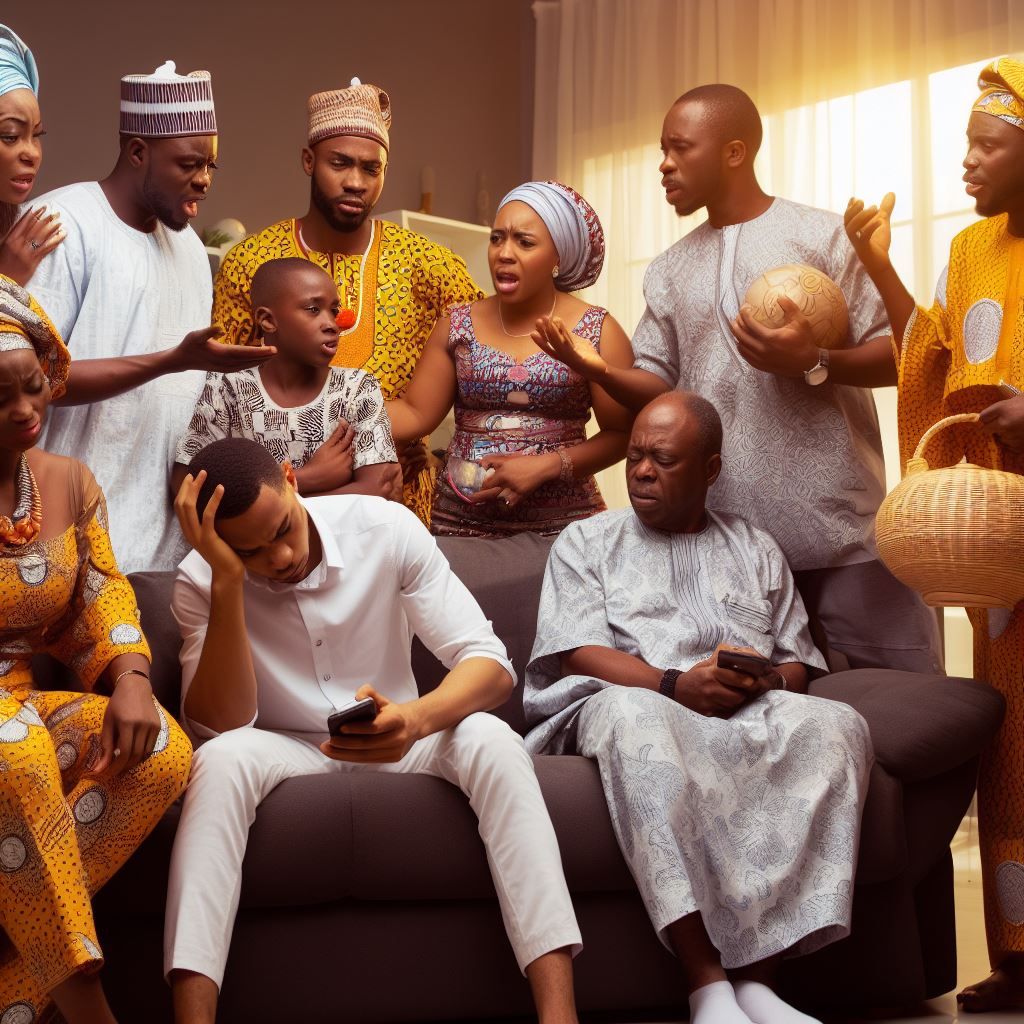Addressing Extended Family Conflicts in Nigerian Marriages
Last Updated on October 17, 2023
Introduction
Extended Family Conflicts in Marriages are notably shaped by the strong emphasis on extended family ties in Nigerian culture.
In this blog post, we will explore the significance of extended family and the conflicts commonly associated with it.
A. Brief explanation of the importance of extended family in Nigerian marriages
In Nigerian culture, the extended family plays a vital role in the lives of married couples.
It extends beyond immediate family members to include aunts, uncles, grandparents, and even distant relatives.
The extended family acts as a support system, providing guidance, financial assistance, and a sense of belonging.
Marriages are seen as a union not just between two individuals but also between two families.
Therefore, the involvement and approval of the extended family are crucial for the success of the marriage.
The extended family provides a sense of security, cultural grounding, and a network of resources.
B. Overview of the common conflicts related to extended family in Nigerian marriages
Despite the benefits, conflicts often arise due to differing expectations and traditions between the spouses and their respective extended families.
One common conflict is the issue of interference.
Extended family members may feel entitled to interfere in a couple’s decisions, leading to disagreements and a lack of privacy.
Another conflict stems from financial expectations.
Extended family members may have financial demands that strain the couple’s resources and put pressure on the marriage.
Additionally, conflicts can arise from the differing values and cultural practices of the extended family and the couple.
These conflicts may range from disagreements on parenting styles to clashes over traditional gender roles.
In the upcoming sections, we will delve deeper into each of these conflicts, providing strategies for addressing and resolving them to maintain a harmonious and successful Nigerian marriage.
Understanding Extended Family Dynamics in Nigeria
A. Definition and Composition of Extended Family in Nigerian Culture
In Nigeria, an extended family is a vital social unit, encompassing multiple generations living together.
- Multigenerational Living: Extended families often include grandparents, parents, children, aunts, uncles, and cousins.
- Shared Resources: Resources like finances, housing, and childcare are commonly shared among extended family members.
B. Roles and Responsibilities of Extended Family Members
Roles within the extended family are well-defined and play significant roles in daily life.
- Elders: Elders are the authority figures, providing wisdom, guidance, and settling disputes.
- Parents: Responsible for the upbringing and education of children in collaboration with extended family members.
- Aunts and Uncles: Assist in caregiving and offer support in various aspects of life.
- Cousins: Share companionship, grow together, and often form strong bonds.
C. Influence of Extended Family in Decision-Making Processes
Extended families exert considerable influence on various aspects of their members’ lives.
- Marriage Decisions: Elders’ consent and advice often play a pivotal role in choosing a spouse.
- Child-Rearing: Extended family members provide childcare and help instill cultural values.
- Financial Support: In times of need, extended family members offer financial assistance and guidance.
- Conflict Resolution: Disputes within the family are often resolved with the input of elders.
Understanding these dynamics is crucial when addressing conflicts that may arise in the context of Nigerian marriages.
Effective communication and negotiation are key to maintaining healthy relationships with extended family members while also prioritizing the needs and well-being of the couple.
Read: The Role of Tradition in Nigerian Marital Conflicts
Common Conflicts Arising from Extended Family Involvement
Extended family plays a significant role in Nigerian marriages, offering support, guidance, and love.
However, this involvement sometimes leads to conflicts that couples must address.
Let’s explore the most common conflicts that arise from extended family involvement in Nigerian marriages.
A. Interference in couple’s privacy and personal lives
One of the primary conflicts that couples face is the interference in their privacy and personal lives.
Extended family members may feel entitled to voice their opinions on every matter, interfering with the couple’s decision-making process.
This can strain the relationship and create unnecessary tension.
B. Financial demands and expectations from extended family
Another common conflict arises from financial demands and expectations placed upon the couple by their extended family.
In Nigerian culture, it is customary for couples to support their family members financially.
However, when these demands become excessive or unrealistic, it can put strain on the marriage and cause disagreements between the couple.
C. Disagreements regarding child-rearing practices
Differences in child-rearing practices between the couple and their extended family can lead to conflicts.
Each family may have their own beliefs and traditions when it comes to raising children.
These differences in opinions can cause tension and disagreements, as the couple may want to raise their children differently from how their extended family suggests.
D. Conflicts due to differing cultural or religious beliefs
Cultural and religious beliefs can also be a source of conflict in Nigerian marriages.
When the couple belongs to different ethnic groups or follows different religious practices, their extended family’s involvement may lead to conflicts.
These conflicts can arise from differing expectations and traditions, causing stress within the marriage.
E. Competition, favoritism, and jealousy among extended family members
Competition, favoritism, and jealousy among extended family members can create conflicts within the marriage.
These feelings of rivalry can stem from inheritance disputes, perceived favoritism, or jealousy over successful relationships.
Couples must navigate these conflicts carefully to prevent them from affecting their marriage.
Generally, while extended family involvement in Nigerian marriages can be enriching, it can also create conflicts.
Couples must address these conflicts by establishing boundaries and open communication.
By acknowledging and dealing with these common conflicts, couples can maintain a strong and harmonious relationship with their extended family while prioritizing their own marriage.
Read: Finding Forgiveness: Prayers for Healing in Marital Conflicts

Effective Strategies for Addressing Extended Family Conflicts
A. Open and honest communication between the couple
In Nigerian marriages, fostering open and honest communication between the couple is crucial in addressing extended family conflicts.
Both partners must create a safe space for dialogue and express their concerns respectfully.
B. Setting clear boundaries and expectations with extended family members
It is essential for the couple to establish clear boundaries and communicate their expectations with their extended family members.
This can help prevent misunderstandings and potential conflicts.
C. Seeking guidance from marital counselors or therapists
When conflicts arise, seeking the help of marital counselors or therapists can provide valuable guidance.
These professionals can facilitate open discussions and provide effective strategies for conflict resolution.
D. Building a strong support system outside of the extended family circle
Having a strong support system outside of the extended family can offer emotional support and guidance during conflicts.
Friends, mentors, or support groups can provide an objective perspective.
E. Compromising and finding common ground with extended family members
In order to address conflicts, it is important for the couple to be willing to compromise and find common ground with their extended family members.
This can help in maintaining harmony and resolving issues.
Addressing extended family conflicts in Nigerian marriages requires proactive measures and effective strategies.
By implementing these strategies, couples can maintain healthy relationships with their extended family members while ensuring the well-being of their marriage.
Read: Marriage Rituals & Traditions: A Deep Dive into Nigeria
Case Study: Resolving Extended Family Conflicts in a Nigerian Marriage
A. Real-Life Situation Involving Extended Family Conflicts
In a small town in Nigeria, Ada and Chike were happily married, but their extended families constantly clashed.
One day, Ada’s mother criticized Chike for not providing enough financial support, causing tension between the families.
B. Steps Taken by the Couple to Address and Resolve the Conflicts
- Ada and Chike acknowledged the gravity of the conflict and decided to prioritize resolving the issue.
- They initiated open and honest conversations with their respective family members separately to understand their concerns.
- Ada and Chike arranged a meeting where both families could express their grievances in a controlled environment.
- During the meeting, the couple acted as mediators, ensuring everyone had a chance to speak without interruption.
- They encouraged empathy and understanding, focusing on the positive aspects of their relationships rather than the conflicts.
- Ada and Chike suggested creating a joint account for shared expenses, which would provide transparency and alleviate financial tension.
- They emphasized the need for cooperation and compromise, emphasizing that family unity was vital for their marriage’s success.
- Ada and Chike actively listened to their family members’ suggestions for improved relationship dynamics and implemented them when appropriate.
C. Lesson Learned and Key Takeaways from the Case Study
- Open communication is essential for addressing extended family conflicts in Nigerian marriages.
- Acting as mediators and fostering a safe environment for dialogue can facilitate conflict resolution.
- Empathy and understanding play a crucial role in resolving conflicts and maintaining healthy family relationships.
- Financial issues often contribute to extended family conflicts, so establishing transparent financial arrangements can help alleviate tensions.
- Both partners should work together to find solutions and ensure the commitment to family unity.
- Active listening and implementing suggestions from family members demonstrate a willingness to improve and strengthen relationships.
- Ongoing effort is necessary to address conflicts, as they may arise in Nigerian marriages due to cultural and traditional factors.
- Prioritizing the well-being of the marriage over individual grievances can lead to long-term family harmony.
In general, Ada and Chike’s case study highlights the challenges faced in Nigerian marriages due to extended family conflicts.
By prioritizing open communication, empathy, and cooperation, they were able to address their families’ concerns and find practical solutions.
The key takeaway is that resolving conflicts requires continuous effort and a commitment to family unity.
By learning from this case study, other couples can strive for healthier and more harmonious extended family dynamics.
Read: The Role of Family in Strengthening Nigerian Marriages
Conclusion
Addressing extended family conflicts in Nigerian marriages is crucial for the success and happiness of the couple.
Ignoring these conflicts can lead to resentment and strain in the relationship.
It is important for couples to prioritize open communication and actively seek resolution when conflicts arise.
By addressing issues early on, misunderstandings can be avoided, and compromises can be reached.
Maintaining a harmonious balance between extended family and marriage requires effort from both partners.
Setting boundaries and establishing clear expectations can help prevent conflicts from escalating.
In the end, the success of a Nigerian marriage depends on the ability of the couple to address and resolve extended family conflicts.
By doing so, they can build a strong foundation and enjoy a peaceful and fulfilling married life.


